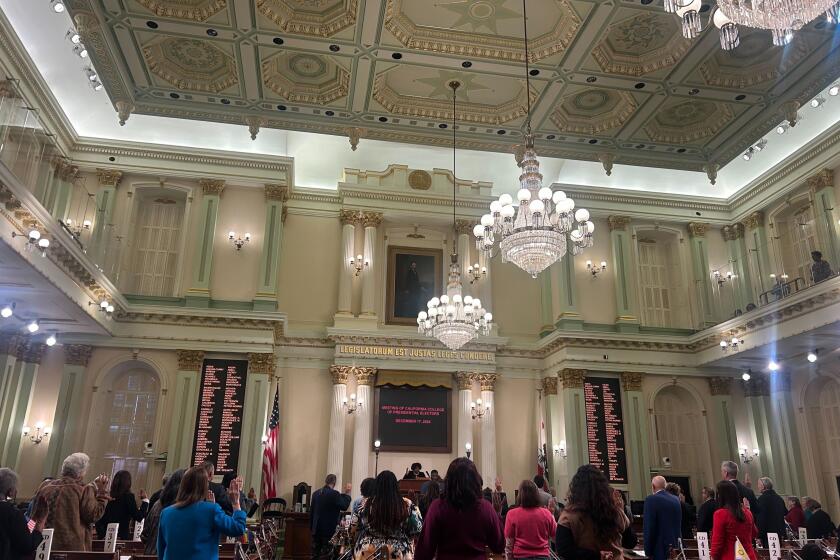On a solemn day at the state Capitol, California’s electoral college gathered to cast their votes for Vice President Kamala Harris, marking a departure from the jubilant atmosphere of 2020. Back then, Democrats celebrated the ousting of Donald Trump, who refused to acknowledge his defeat amid baseless claims of voter fraud. This year’s ceremony was characterized by quiet reflection and a sense of muted disappointment, underscored by the reality that despite Harris’s victory in California, she would not assume the presidency as Trump was set to return to the White House. Harris garnered approximately 58% of the votes in her home state, yet lost the national electoral college battle decisively with 312 votes for Trump versus 226 for Harris.
The mood at the Capitol contrasted sharply with the spirited celebration of Democratic achievements in 2020. Secretary of State Shirley Weber encouraged the electors, who gathered in the Assembly chamber, to view the event positively despite the defeat. She emphasized the importance of their commitment to democracy, urging the assembly to remember that democracy thrives on participation. Rusty Hicks, chair of the California Democratic Party, echoed this sentiment, asserting that California remains a “beacon of freedom” despite the national defeat. Although Republicans gained control of Congress and the presidency, California Democrats highlighted their victories, having unseated three Republican incumbents in tight congressional races.
Hicks addressed the mixed emotions surrounding the electoral outcome, recognizing the disappointment among many Democrats. Nevertheless, he reinforced the principles of democracy and civic engagement. He spoke to the importance of honoring the electoral process and participating in democratic governance, regardless of personal outcomes. California’s electors represented a broad spectrum of Democratic figures, including city council members, mayors, and nonprofit leaders, showcasing the party’s deep-rooted engagement in local governance.
Key political figures, including Assembly Speaker Robert Rivas, acknowledged the task ahead in resisting the incoming conservative policies of the Trump administration. Rivas opened the ceremony on a note of hope, reminding attendees of the enduring values of freedom and fairness. Another significant presence at the event was newly elected Congressman Adam Gray, who expressed a willingness to collaborate with Trump where possible and a commitment to serving his constituents despite the electoral setbacks.
Electors, such as Xiomara Flores-Holguin, voiced their determination to refocus efforts on voter engagement, particularly among Latino communities, in anticipation of future elections. Flores-Holguin’s reflections highlighted a shared sentiment of resilience among Democrats, signaling a commitment to learning from recent experiences while fostering a culture of hope and activism. She articulated the belief that, despite setbacks, the party would not retreat and was prepared to build on lessons learned in striving for electoral success.
In sum, California’s electoral college ceremony symbolized both a retrospective acknowledgment of the recent electoral challenges and an underlying optimistic resolve to engage in America’s democratic processes. While the outcome was not as desired for the gathered electors, their collective commitment to democratic principles and the future of civic engagement reflected the enduring spirit of activism among the state’s Democrats, suggesting a readiness to confront challenges head-on as they look to the future.

